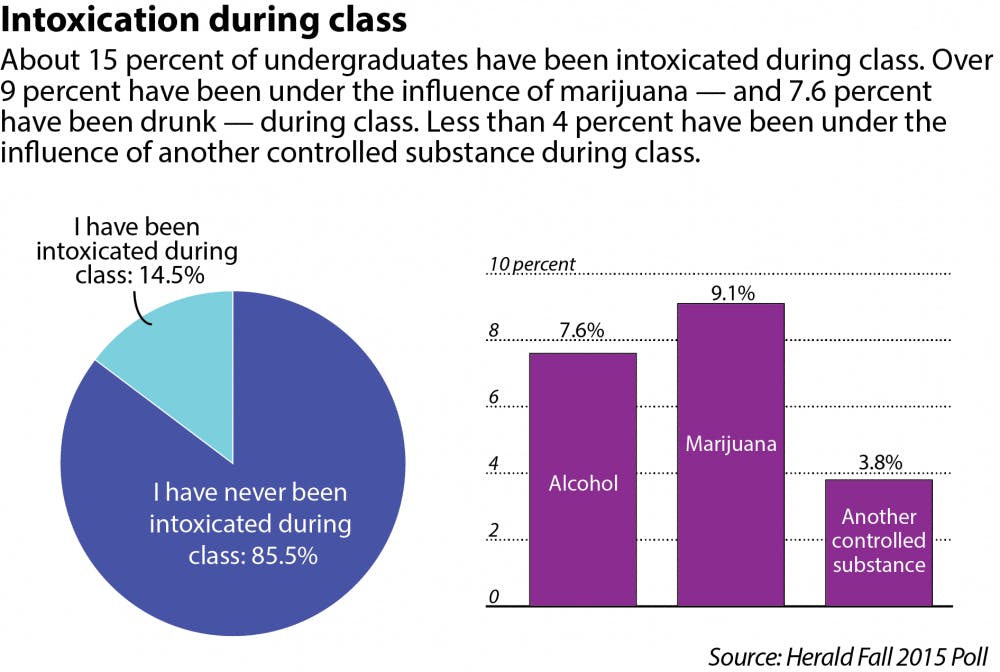While many think of alcohol and marijuana as confined to parties and dorm rooms, these substances also stage an appearance in the classroom. Approximately 15 percent of Brown students have attended class under the influence of a substance, according to a poll conducted by The Herald last month.
About 9 percent of Brown students have attended class under the influence of marijuana, 7.6 percent of students have attended class under the influence of alcohol and 3.8 percent of students have attended class under the influence of another controlled substance, according to the poll.
The poll revealed a correlation between gender and intoxication during class: Male students were twice as likely as female students to have attended class under the influence.
“I would say, anecdotally, the percentage of guys who use weed is higher,” said Ethan Taswell ’19.
Political leanings also emerged as a correlated factor. Nearly 64 percent of students who said they have been under the influence of marijuana during class said they would vote for Bernie Sanders, compared to 45 percent of all respondents. But 17.5 percent of students who said they have been high during class said they would vote for Hillary Clinton, compared to 23 percent of all respondents.
Members of Greek organizations were more likely to have attended class under the influence. While 11 percent of Brown students are involved in Greek life, 22 percent of the students who said they have attended class under the influence of marijuana and 14 percent of the students who indicated they have gone to class under the influence of alcohol are in a Greek organization.
“I’m surprised it’s more weed than alcohol in frats,” said Kyle Tildon ’19, noting that fraternities have a reputation for alcohol use.
Additionally, students who have sold illegal drugs for profit were six times as likely to have attended class under the influence of drugs.
Many students expressed little surprise at the correlations.
The liberal campus atmosphere may be more conducive to smoking weed, said one first-year who asked to remain anonymous due to confidentiality concerns.
Several students noted that Spring Weekend may have skewed the poll results, as students may experiment with substances during the concerts but not during the rest of the semester.
“Before Spring Weekend, I had class all day. And in my last class of the day, everyone showed up totally drunk except me,” said a sophomore who requested anonymity for privacy reasons. “There were people drinking straight vodka from Poland Spring bottles.”
Another sophomore said he attended almost every session of his first-year seminar under the influence of marijuana after he “saw the direction the class was going.”
The sophomore, who requested anonymity for fear of self-incrimination, said smoking marijuana on the way to the seminar — his only humanities class on top of four science, technology, engineering and mathematics courses — helped him engage with the material and contribute to discussion.
Smoking before class “made it more fun and interesting,” he said. “It was also an experiment to do the whole course high, just to see what would happen.”
“You could probably only get away with this in a freshman seminar” because it “won’t determine your career,” he said. But he noted that he still took the class seriously and went prepared to each seminar. “It was my favorite course,” he said.
High students in class are “more common than you think because you don’t know someone is doing it,” he added, noting that alcohol is more conspicuous.
Carol Cohen, senior associate dean of the College for class advising and health and personal issues, said it is important to distinguish between students who arrive to class under the influence once and those who arrive to many or all classes under the influence.
Cohen, who works with students whose academic performances suffer due to substance abuse, noted that the poll did not distinguish between one-time or recreational users and more frequent or addicted users.
Currently, her office is currently conducting a search for a dean for issues of chemical dependency. The person who fills this position will work as a liaison for sobriety groups on campus and Health Services.
The dean would not be a clinician, but rather “an academic dean who intimately understands the struggles of a person dealing with a substance issue and helping them to succeed academically,” Cohen said.
“If anything is surprising (about the data), it’s just sort of the normalness of the idea that anybody would go to class under the influence,” she said.
Cohen stressed the importance of refraining from writing off students’ substance use as typical college behavior without risk. “I’m comfortable with (students’ substance use) as long as people are happy and healthy doing it,” she said.





